Australian Lawmakers Urge Iran To Stop Death Sentences For Protesters
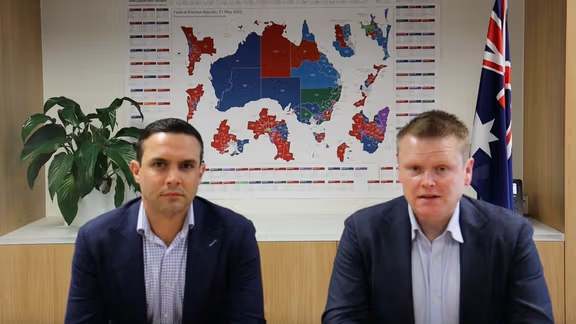
Two members of the Australian House of Representatives have called on the Islamic Republic to stop issuing death sentences for people arrested in recent protests.

Two members of the Australian House of Representatives have called on the Islamic Republic to stop issuing death sentences for people arrested in recent protests.
In a letter to the Charge d'affaires of The Islamic Republic in Australia Tuesday, Keith Wolahan and Aaron Violi said no one should receive deaths sentence for exercising political rights.
Keith Wolahan an Aaron Violi also offered to take political sponsorship for fifteen protestors imprisoned in Iran who are facing the death sentence.
“Mohammed Mehdi Karami is only 22 years of age and has just been sentenced to death for protesting,” said Wolahan in the letter.
Wolahan also added that it was heartbreaking to hear of Karami's phone call with his father where he asked him not to tell his mother about what is just being announced.
For his part, Aaron Violi also stressed that as members of the Australian Federal parliament, he and Keith Wolahan sponsored 15 protesters for protection from the Islamic Republic regime, including Karami.
“Behind every protester that is in prison is their families that are suffering, and we are calling on the Islamic Republic regime to show mercy on these protesters and their families,” he underlined.
Earlier in November, Wolahan expressed solidarity with Iranians in their fight against clerical rule, saying that the Islamic Republic will face the consequences of mistreating protesters.
Wolahan represents the division of Menzies where the largest population of Iranians live in Australia.
Amid the protests after the death in custody of Mahsa Amini in mid-September, Iranian clerical rulers executed two anti-regime protesters namely Mohsen Shekari and Majidreza Rahnavard, both 23.
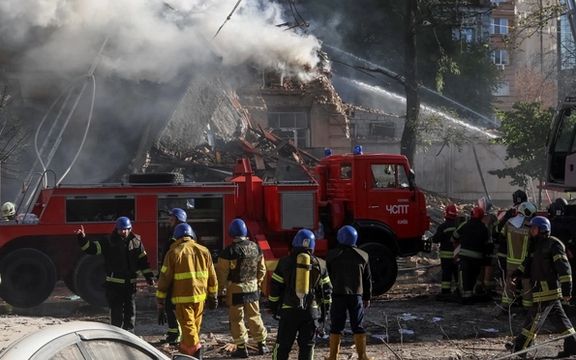
Ned Price, US foreign affairs spokesman, has called Iran “one of the most complex challenges we face” and reiterated the 2015 nuclear deal is off the US agenda.
Speaking to the press Wednesday, Price, the State Department spokesman, said the United States had “no reason to put any stock or faith into the statements” made recently by Iranian officials that they were keen to resume talks over reviving the 2015 agreement, the JCPOA (Joint Comprehensive Plan of Action).
“There was a deal to mutually return to the JCPOA that was on the table that was approved by all parties” in September, Price said. “That ultimately went nowhere only because the Iranians weren’t prepared to accept it…The JCPOA hasn’t been on the agenda for some months now.
“There is no denying that Iran presents one of the most complex challenges we face… Its nuclear program has been the focus of successive administrations. Its malign activities throughout the Middle East and in some cases potentially even beyond has been the focus of successive administrations…And now what it is doing to its own people – the repression……[and] the security assistance that it’s providing to Russia – all of these…. represent…one of the most difficult challenges we face.”
While failure to agree JCPOA restoration in either year-long multilateral talks in Vienna or subsequent bilateral US-Iran contacts reflected gaps between Iran and the US over JCPOA restoration, Price’s reference to complexities reflects new complications.
‘On the agenda, but not on the table’
Firstly, Iran’s supply of military drones to Russia has shifted the approach of the three European JCPOA signatories, France, Germany, and the United Kingdom. While the European Union foreign policy chief Joseph Borrell has continued diplomatic efforts with Iran, meeting Foreign Minister Hossein Amir-Abdollahian in Amman in December, European officials have intimated that Iran’s involvement with Russia precludes JCPOA revival.
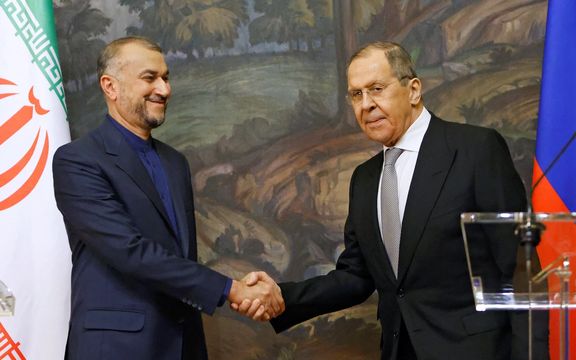
Europe long held to the JCPOA logic of separating Iran’s nuclear program from other issues, but it has agreed with the US that the drones supply – even if, as Iran says, before the February outbreak of the latest Ukraine hostilities – violates a JCPOA clause restricting Iran trading certain categories of arms.
European states have joined the US in levying new sanctions against Iran over both the drones and Tehran’s response to recent unrest. Hossein Mousavian, former Iranian Deputy Foreign Minister and nuclear negotiator, told Al-Monitor this meant the JCPOA was now “on the agenda but not on the table.”
Mousavian said the “Europeans are playing a more active role to create an international consensus against Iran, more because of the Ukraine issue…[and] compared to the US…[had] become ‘more Catholic than the Pope’ in advancing hostile policies against Iran.”
A second complication is the return to office in Israel of Benjamin Netanyahu with a coalition including ultra-Zionists, which has created a new challenge for Washington. While Netanyahu, who has for decades portrayed Iran as on the threshold of a nuclear weapon, is playing up his warm relationship with President Joe Biden, there are clear US nerves.
‘Security and stability’
A Pentagon read-out of the first telephone call, late Wednesday, between US Defense Secretary Lloyd Austin and new Israeli counterpart Yoav Gallant featured Austin warning Israel not to “undermine security and stability in the West Bank,” a reference to speeding up Jewish settlements in occupied Palestinian land.
The US read-out referred to agreement “on the need to work together to address…regional challenges, including threats posed by Iran’s destabilizing activities,” while the Israeli defense department statement said Gallant had “emphasized in the conversation Israel’s commitment to do whatever it takes to prevent Iran from obtaining nuclear weapons...”
Something similar happened with Monday’s call between Antony Blinken, US Secretary of State, and Eli Cohen, the Israeli foreign minister. A right-wing Israeli newspaper cited sources that Blinken had proclaimed the JCPOA dead. The US read-out of the call made no mention of this, and a US official subsequently denied it.
Security analysts have also discussed whether growing US-Israel military co-operation, highlighted this week by joint air drills, makes an attack on Iran more likely or is rather a means to rein in a Netanyahu-led Israel.

Famous Iranian actress Taraneh Alidousti has finally been released from prison on a heavy bail amid international outcry for her freedom.
The Iranian popular cinema star, who was detained three weeks ago after expressing support for nationwide protests, was freed from the notorious Evin prison in Tehran Wednesday on a bail of more than 30,000 dollars, or ten billion Iranian rials.
Photos published on social media show that she was welcomed by a group of cinema artists after the release.
Alidousti, who previously published a photo of herself without headscarf on social networks, was not wearing the mandatory hijab in these photos again.
This comes as on Wednesday Iran’s authoritarian Supreme Leader Ali Khamenei said in a meeting with a group of pro-regime women that "The hijab is undoubtedly a religious and inviolable necessity.”
Reports said that 20 days ago Taraneh Alidousti was transferred to ward 209 of Evin prison which is administered by the intelligence ministry.
The detention of Alidousti drew widespread international reactions, especially from the most prestigious film festivals in the world, such as Cannes, Berlinale, and Tribeca.
Over 600 artists around the world signed a petition urging the Islamic Republic to release the Iranian actress.
In the online campaign launched under the title "Justice for Taraneh Alidousti", dozens of the world's most prominent figures, including Mark Ruffalo, Pedro Almodovar, Penelope Cruz, Juliette Binoche, Alfonso Cuaron and Ken Loach joined the signatories.
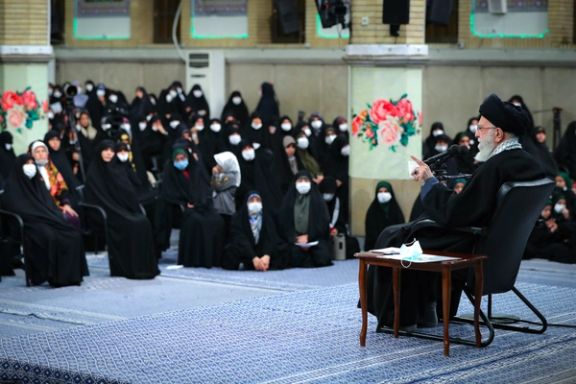
Islamic Republic’s Supreme Leader Ali Khamenei has reiterated the regime’s propaganda about the current wave of protests, failing to acknowledge women’s rebellion against hijab.
Addressing a group of cherrypicked women from his supporters on Wednesday, he rejected the facts that women are unveiling in public to defy the mandatory Islamic dress code – or hijab. It was forcible enforcement of hijab in society that triggered popular protests since September - the boldest challenge the Islamic Republic has ever faced.
“The absolute brazenness of the West comes into sight when it presents itself as the forerunner of advocacy for women’s rights, whilst it is responsible for flurries of blows dealt to the dignity and prestige of women. This could be explained as utter shamelessness... This is what they suggest by women’s rights and freedom. This is by no means freedom, but rather utter slavery,” Khamenei said.
Despite a massive number of videos and photos of women and schoolgirls unveiling and burning their headscarves in protest to the compulsory hijab as well as the clerical regime, Khamenei claimed that women did not remove their hijab during the protests.
Khamenei’s refusal to acknowledge 110 days of ongoing protests, ignited by the death of 22-year-old Mahsa Amini in the hands of hijab enforcement police, has led to an explosion of tweets and posts against him and the regime on social media Wednesday.
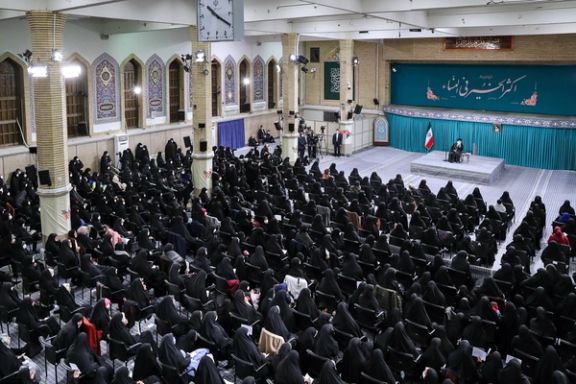
During the hour-long session, he almost exclusively talked about women and hijab but stopped short of stating his final opinion about how to enforce hijab in society, which could lead to more protests. Khamenei called hijab a religious must but added that those who do not wear “full hijab” should not be accused of irreligious. Describing hijab as the inevitable duty for all Muslim women, at the same time he emphasized that no Iranian woman should be labeled as non-religious or anti-revolutionary if she fails to fully honor the obligation.
He criticized the intermingling of men and women in Western societies, saying that contrary to the propagated notion, the coexistence has failed to diminish men’s carnal desires and has instead amplified it, resulting in women and girls being sexually harassed on streets, in workplaces, educational centers and even in military facilities. “Sex trade, sexual slavery, violation of all moral and humanitarian principles, and legalization of issues that are forbidden in all divine religions” are now widely prevalent across the West, Khamenei claimed. He failed to mention that all these problems exist also in Iran and “men’s carnal desires” are legalized in the Islamic Republic where they can legally have up to four wives and as many concubines as they desire.
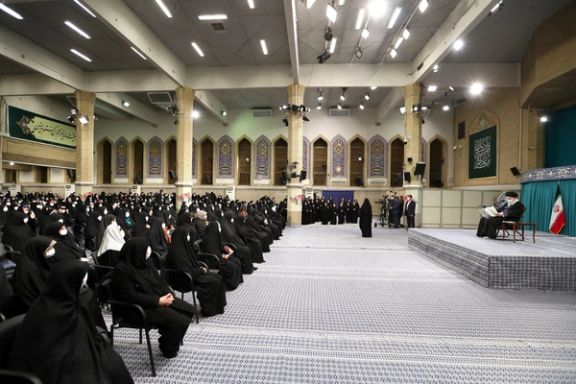
He also opted not to talk about the inequality of men and women in their basic rights. The Islamic Republic’s constitution clearly states that women are considered as inferior to men in terms of inheritance, testifying in courts and in many other areas according to the Islamic law or sharia. Women in Iran are not allowed to travel abroad without the permission of a male guardian, their share in inheritance is half of what male family members receive -- the financial compensation paid to survivors in cases of unnatural death, is also half of that of a man.
Khamenei tried to sound progressive by underlining the importance of employing efficient, experienced, knowledgeable, and wise women at various levels of Iran’s decision-making apparatus, but practically women hardly ever manage to be appointed for top jobs, let alone the jobs that are totally banned for women, such as becoming a judge. He pointed to motherhood and homemaking as the two main and primary roles of each and every woman.
In December, the Islamic Republic was voted out of the United Nations Commission on the Status of Women (CSW) for policies contrary to the rights of women and girls.
In its 2022 report on the Global Gender Gap Index, which was released in July, the World Economic Forum placed Iran at the rock bottom only after Afghanistan, Pakistan, and Congo.

Amid increasing pressure on imprisoned protestors, the wave of hunger strikes in Iranian prisons is on the rise with the detainees’ health in danger.
Mohammad Reza Azhar, an 18-year-old teenager, who was arrested in the religious city of Mashhad in the northeast on September 22, said in an audio message that the blood vessels of his eyes were torn due to severe mental pressure.
Meanwhile, Armita Abbasi, and over a dozen other prisoners in Kachouie prison of Karaj, west of Tehran, have gone on hunger strike since Monday to protest the lack of attention to their indefinite detention, lack of access to lawyers and the danger of harsh verdicts.
Jasmin Haj Mirza Mohammadi, a 25-year-old citizen, who was sentenced to five years in prison has also refused to eat anything since Monday.
Hamideh Zarei, suffering from anemia and low blood pressure, is also on strike while her move is extremely dangerous for her health.
Another prisoner close to her said Hamideh was severely beaten while being arrested, adding that her court was held on December 29 through video call as she was not allowed to choose a lawyer.
On the other hand, reports say Farshid Nowrozi, an English literature professor at Mazandaran University, has been expelled for supporting protesting students.
However, the authorities of the Islamic Republic are still denying the bloody suppression of the protests. On Tuesday, Masoud Satayshi, the judiciary spokesman, called numerous reports about sexual harassment and rape of imprisoned women "lies”, saying no documents have been presented in this regard so far.
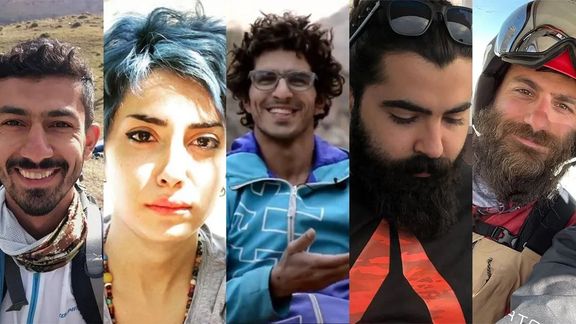
The Islamic Republic has framed several Iranian athletes saying they were planning a terrorist bombing in a case full of contradictory remarks by the officials.
Security organs have arrested at least five athletes – all hailing from the city of Shiraz – on charges of being involved in a "bombing" plot, which the agents of the Islamic Republic claim to have foiled.
The five were arrested in a period of about one month from late October to November 2022 in different cities. Iran International’s Maryam Moqaddam says at least 10 people were implicated in the case but only the names of five of them were released to the media. Snowboard instructors Dena Sheibani and Arsalan Mahdavi, climbing instructor Hesam Mousavi, former national team mountain biker Eshragh (Eshraq) Najafabadi, and mountaineer Mohammad Khiveh are the five detained on charges of planning the bombing.
As is the new normal for the detentions in Iran, the authorities also extracted confessions from them under duress. There are some unconfirmed reports that Sheibani and Khiveh were released on bail.
Their case had been full of conflicting statements since the beginning. Even the place of the alleged bombing is not yet known. On October 28, the authorities announced that they arrested someone carrying “a bag of explosives with strong destruction power” who wanted to plant a bomb in Shiraz’s Ma'aliabad neighborhood.
A deputy for political and security issues of Fars province’s governor earlier rejected reports of “the bombing” saying that no bomb was planted and explosives such as TNT were not involved. Someone with a package that contained “flammable liquids and some accessories" was arrested in the neighborhood, he claimed.
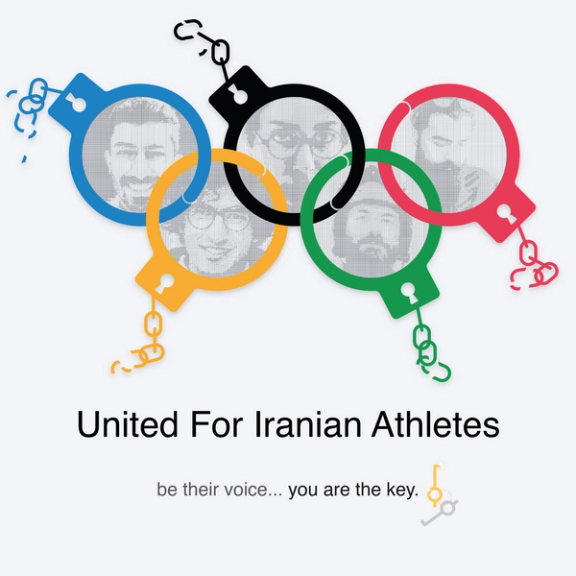
In a video of forced confessions, the climbing instructor Mousavi said that the bombing was planned to take place outside the governor’s office, which is more than a two-hour walk to the Ma'aliabad neighborhood. In the videos, Dena Shibani, the only woman accused in this case, was introduced as the "publicity officer responsible for advertising and testing operations" without providing further details about her role.
However, on December 1, some state media reported a different story of the alleged "bombing" saying that a “suspicious package” was “neutralized” by the bomb squad. In videos published by the state media, some officers seem to be removing small plastic bags of something supposed to be explosives from a small bucket.
The real reason for arresting so many sports people is not even clear, but the indications of extracting forces confessions and contradictory statements by officials clearly show an attempt to frame the detainees.
The arrests occurred only a few days after Iran’s intelligence ministry had announced the arrest of 26 people including foreigners on charges related to an attack on a Shia shrine October 26 that killed 15 people. The ministry said in a statement that these people were detained in different provinces as well as “at the eastern borders while fleeing the country.”
The ministry identified the assailant in Shahcheragh shrine as a Tajik citizen named Sobhan Komrooni with the nickname “Abu Aisha” and an Afghan person named Mohammed Ramez Rashidi as the “supporting element” of the operation. ISIS took responsibility for the attack on the Shahcheragh in Shiraz on October 26, but some questioned the Islamic Republic’s account saying it was staged by the regime itself to distract attention from nationwide protests.